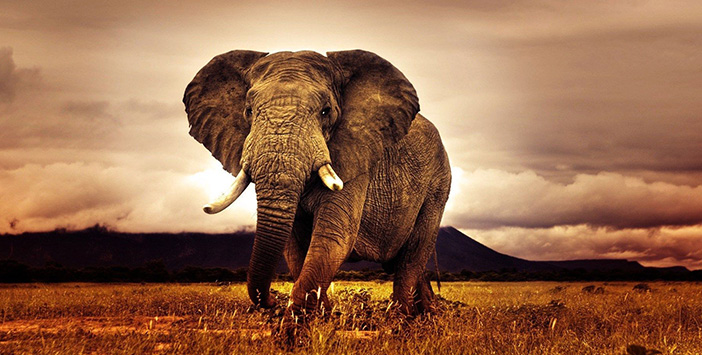What happened at the year of the elephant? What is the year of the elephant in Islam? The Elephant Incident: A Testimony of Divine protection…
The Kaabah, built on the command of Allah, glory unto Him, stands under constant Divine protection. Attesting to this is the famous event known in history as the Elephant Incident, replete with lessons to be drawn from it.
THE ELEPHANT INCIDENT
Abraha, a Roman vassal and governor of Yemen, had built a big, ornamented church in Sana, hoping to divert local attention thereto. The Arabs, however, showed very little interest in the church, much to the disappointment and vexation of the Governor. To implement this program, Abraha then decided to demolish the Kaabah, their center of attraction, the Sacred House that always drew visitors. Having prepared a great army that included many elephants, comparable to today’s tanks, Abraha headed for Mecca to carry out his plan and render the church unrivaled in the quest for people’s attention.
Near Kasbah, Abraha laid claim to some camels belonging to the Meccans, some of which belonged to Abdulmuttalib, the grandfather of the Blessed Prophet -upon him blessings and peace-, who came to Abraha to ask to have his camels back. Angered at Abdulmuttalib’s concern for a few camels, Abraha lashed out:
“I have come to demolish the Kaabah and you are only concerned for your camels!”
“The Kaabah has an owner to protect it”, Abdulmuttalib answered calmly.
“Nobody today shall stand in my way to protect it”, Abraha then commented arrogantly.
When Abraha finally commanded his army to march on towards the Kaabah, the elephants stood their ground, unable to move forward. Suddenly, the skies were filled with birds in flight, which begun pelting the army with little stones of baked clay they were carrying with their claws. The stones struck each and everyone in the army like hailstones, destroying whatever they touched. The tiny birds were pulverizing the seemingly invincible elephants standing in tons of weight. The year in which this miraculous event took place was thereafter known by Arabs as the Year of the Elephant.
The Almighty narrates this story in the Holy Quran as follows:
“Have you not seen how your Lord dealt with the owners of the Elephant?
Did He not make their treacherous plan go astray?
And He sent against them Flights of Birds,
Which pelted them with stones of baked clay,
Then did He make them like an empty field of stalks and straw, (of which the corn) has been eaten up. ” (al-Fîl, 1-5)
The Kaabah, the House of Goodness serving as a place of worship to one God, was all along blessed by Allah, glory unto Him, and kept under His protection.
The punishment exacted from Abraha for his disrespect towards the Kaabah remains in no uncertain terms a warning until the Final Hour for others who may harbor similar malice against the Sacred House.
The Quran similarly extends this value to all the mosques of Allah, glory unto Him.
“And who is more unjust than he who prevents (men) from the mosques of Allah, that His name should be remembered in them, and strives to ruin them? (As for) these, it was not proper for them that they should have entered them except in fear; they shall meet with disgrace in this world, and they shall have great chastisement in the hereafter.” (al-Baqara, 114)
Blinded by his boundless arrogance, Abraha considered himself to have great power, and the punishment he was given is indeed fitting. He was not struck by beasts known for their strength like lions and tigers or even poisonous snakes but by feeble birds carrying pebbles smaller than chickpeas. The Almighty thus destroys arrogant disbelievers like the Pharaoh, Nimrod and Goliath with seemingly powerless creatures, in order to show how weak they are in reality.
Abraha was now returning to Yemen, the land he had set out from in great honor and majesty, in a very contemptible way. With his body in wounds and clothes in tatters, he was almost crawling back to his town. His plight provides a striking lesson in showing how disgrace follows the arrogant even in this world.
Called by the Quraysh the Year of Elephant, that year marked the starting point of their calendar. Qubash ibn Ushaym –Allah be well pleased with him-, a Companion of the Prophet –upon him blessings and peace-, for instance, used to cite the Year of Elephant in telling others how he and the Prophet -upon him blessings and peace- were born in the same year.
Othman ibn Affân -Allah be well-pleased with him- once inquired further as to who was bigger age wise, to which Ibn Ushaym -Allah be well-pleased with him- responded in the most polite and considerate of manners:
“The Prophet -upon him blessings and peace- is of course much greater than me but as far our ages are concerned, I was born before him,[1] as I remember seeing the droppings of Abraha’s elephants: they were still green and little altered.” (Tirmidhî, Manâqıb, 2)
Source: Osman Nuri Topbaş, The Prophet Muhammed Mustafa the Elect, Erkam Publications
[1] As evident in this narration, the Companions were always conscious of the fact that the Blessed Prophet -upon him blessings and peace- was of the highest and most sublime rank, with regard to which they were of utmost sensitivity. Just a touch of their skin by the Blessed Prophet -upon him blessings and peace-, for them, provided reason for gratification, as many a fortunate Companion touched by those sacred hands, would point to their own hands and say:
“It was with these two hands that I pledged allegiance to the Messenger of Allah!” (Ibn Saad, IV, 306; Haythami, VIII, 42)



